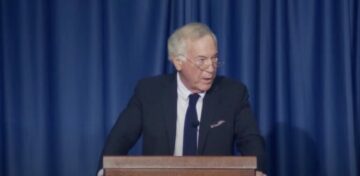
Arthur Hayes, the Co-Founder and former CEO of BitMEX, recently penned a comprehensive blog post examining the Federal Reserve’s monetary policy and its implications for the cryptocurrency market. Hayes scrutinizes the Fed’s dual control over both the quantity and price of money, arguing that this approach is counterproductive and politically motivated.
Hayes begins by outlining the Federal Reserve’s two-pronged approach to monetary policy: controlling the quantity and price of money. He explains that the Fed adjusts the size of its balance sheet through the buying and selling of U.S. Treasuries and Mortgage-Backed Securities (MBS). When the balance sheet expands, the policy is termed Quantitative Easing (QE), and when it contracts, it’s called Quantitative Tightening (QT).
Hayes is critical of the Fed’s outsized influence on U.S. fixed income markets. He argues that the institution’s ability to print money at will and unilaterally change financial rules has essentially stripped these markets of their freedom. He further contends that the Fed’s actions are politically expedient, especially with the 2024 U.S. elections looming. This political backdrop, he believes, has paralyzed the Fed’s decision-making capabilities.
<!–
–> <!–
–>
Hayes describes the Fed’s current policy as a paradox. When the Fed raises interest rates, it must print more money to pay depositors in its Reverse Repo Program (RRP) and the Interest on Reserve Balances (IORB). This action is in direct conflict with the Fed’s objective of reducing its balance sheet to fight inflation. Hayes highlights the detrimental impact of this policy on smaller banks and the businesses that rely on them for credit, stating that it exacerbates their financial struggles.
Hayes posits that cryptocurrencies, especially Bitcoin, stand to gain from the Fed’s flawed policies. He argues that as the traditional banking system continues to falter, the value proposition of Bitcoin and other cryptocurrencies becomes increasingly compelling. Hayes also notes that the Fed’s policies create a conducive environment for both tech stocks and cryptocurrencies, as they offer better returns than simply parking money with the Fed.
Hayes suggests that the crypto market will remain resilient, even in the face of potential market corrections. He believes the large sums of interest income searching for new investment avenues will likely find their way into finite-supply financial assets like cryptocurrencies. Hayes advises investors to embrace the current market conditions, viewing them as an opportunity for strategic investments in the crypto space.
- SEO Powered Content & PR Distribution. Get Amplified Today.
- PlatoData.Network Vertical Generative Ai. Empower Yourself. Access Here.
- PlatoAiStream. Web3 Intelligence. Knowledge Amplified. Access Here.
- PlatoESG. Automotive / EVs, Carbon, CleanTech, Energy, Environment, Solar, Waste Management. Access Here.
- PlatoHealth. Biotech and Clinical Trials Intelligence. Access Here.
- ChartPrime. Elevate your Trading Game with ChartPrime. Access Here.
- BlockOffsets. Modernizing Environmental Offset Ownership. Access Here.
- Source: https://www.cryptoglobe.com/latest/2023/08/bitmex-co-founder-arthur-hayes-dissects-the-federal-reserves-policy-and-its-ripple-effect-on-crypto/
- :has
- :is
- :not
- 2024
- a
- ability
- Action
- actions
- Ads
- All
- also
- an
- and
- approach
- ARE
- Argues
- Arthur
- arthur hayes
- AS
- Assets
- At
- avenues
- backdrop
- Balance
- Balance Sheet
- balances
- Banking
- banking system
- Banks
- becomes
- believes
- Better
- Bitcoin
- BitMEX
- both
- businesses
- Buying
- by
- called
- capabilities
- ceo
- change
- Co-founder
- compelling
- comprehensive
- conditions
- conflict
- continues
- contracts
- control
- controlling
- Corrections
- counterproductive
- create
- credit
- critical
- crypto
- Crypto Market
- crypto space
- cryptocurrencies
- cryptocurrency
- cryptocurrency market
- CryptoGlobe
- Current
- Decision Making
- depositors
- direct
- easing
- Elections
- embrace
- Environment
- especially
- essentially
- Even
- Examining
- expands
- Explains
- Face
- falter
- Fed
- Federal
- Federal Reserve’s
- fight
- financial
- Find
- fixed
- fixed income
- flawed
- For
- Former
- former ceo
- Freedom
- from
- further
- Gain
- he
- highlights
- HTTPS
- Impact
- implications
- in
- Income
- increasingly
- inflation
- influence
- interest
- Interest Rates
- into
- investment
- Investments
- Investors
- IT
- ITS
- jpg
- large
- like
- likely
- looming
- Market
- market conditions
- Markets
- Monetary
- Monetary Policy
- money
- more
- motivated
- must
- New
- new investment
- Notes
- objective
- of
- offer
- on
- Opportunity
- Other
- over
- Paradox
- parking
- Pay
- plato
- Plato Data Intelligence
- PlatoData
- policies
- policy
- political
- politically
- potential
- price
- print money
- Program
- proposition
- QE
- QT
- quantitative
- Quantitative Easing
- quantitative tightening
- quantity
- raises
- Rates
- recently
- reducing
- rely
- remain
- Reserve
- reserves
- resilient
- returns
- reverse
- rules
- s
- Screen
- screens
- searching
- Securities
- Selling
- sheet
- simply
- Size
- sizes
- smaller
- Space
- stand
- stating
- Stocks
- Strategic
- Struggles
- Suggests
- sums
- system
- tech
- tech stocks
- than
- that
- The
- the Fed
- their
- Them
- These
- they
- this
- Through
- tightening
- to
- traditional
- traditional banking
- Treasuries
- u.s.
- U.S. Treasuries
- use
- value
- viewing
- Way..
- when
- will
- with
- zephyrnet












